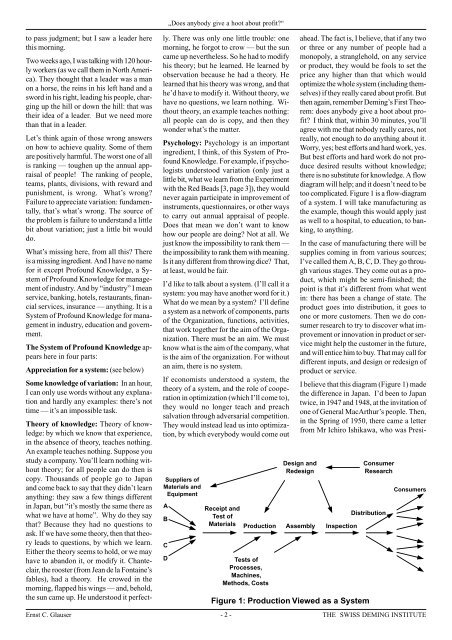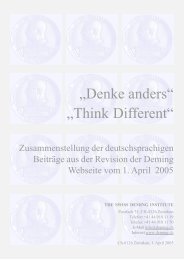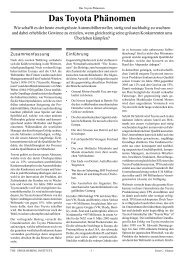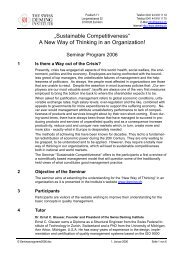“Does anybody give a hoot about profit?” - Swiss Deming Institute
“Does anybody give a hoot about profit?” - Swiss Deming Institute
“Does anybody give a hoot about profit?” - Swiss Deming Institute
Create successful ePaper yourself
Turn your PDF publications into a flip-book with our unique Google optimized e-Paper software.
to pass judgment; but I saw a leader here<br />
this morning.<br />
Two weeks ago, I was talking with 120 hourly<br />
workers (as we call them in North America).<br />
They thought that a leader was a man<br />
on a horse, the reins in his left hand and a<br />
sword in his right, leading his people, charging<br />
up the hill or down the hill: that was<br />
their idea of a leader. But we need more<br />
than that in a leader.<br />
Let’s think again of those wrong answers<br />
on how to achieve quality. Some of them<br />
are positively harmful. The worst one of all<br />
is ranking — toughen up the annual appraisal<br />
of people! The ranking of people,<br />
teams, plants, divisions, with reward and<br />
punishment, is wrong. What’s wrong?<br />
Failure to appreciate variation: fundamentally,<br />
that’s what’s wrong. The source of<br />
the problem is failure to understand a little<br />
bit <strong>about</strong> variation; just a little bit would<br />
do.<br />
What’s missing here, from all this? There<br />
is a missing ingredient. And I have no name<br />
for it except Profound Knowledge, a System<br />
of Profound Knowledge for management<br />
of industry. And by “industry<strong>”</strong> I mean<br />
service, banking, hotels, restaurants, financial<br />
services, insurance — anything. It is a<br />
System of Profound Knowledge for management<br />
in industry, education and government.<br />
The System of Profound Knowledge appears<br />
here in four parts:<br />
Appreciation for a system: (see below)<br />
Some knowledge of variation: In an hour,<br />
I can only use words without any explanation<br />
and hardly any examples: there’s not<br />
time — it’s an impossible task.<br />
Theory of knowledge: Theory of knowledge:<br />
by which we know that experience,<br />
in the absence of theory, teaches nothing.<br />
An example teaches nothing. Suppose you<br />
study a company. You’ll learn nothing without<br />
theory; for all people can do then is<br />
copy. Thousands of people go to Japan<br />
and come back to say that they didn’t learn<br />
anything: they saw a few things different<br />
in Japan, but “it’s mostly the same there as<br />
what we have at home<strong>”</strong>. Why do they say<br />
that? Because they had no questions to<br />
ask. If we have some theory, then that theory<br />
leads to questions, by which we learn.<br />
Either the theory seems to hold, or we may<br />
have to abandon it, or modify it. Chanteclair,<br />
the rooster (from Jean de la Fontaine’s<br />
fables), had a theory. He crowed in the<br />
morning, flapped his wings — and, behold,<br />
the sun came up. He understood it perfect-<br />
Ernst C. Glauser<br />
„Does <strong>anybody</strong> <strong>give</strong> a <strong>hoot</strong> <strong>about</strong> <strong>profit</strong>?“<br />
ly. There was only one little trouble: one<br />
morning, he forgot to crow — but the sun<br />
came up nevertheless. So he had to modify<br />
his theory; but he learned. He learned by<br />
observation because he had a theory. He<br />
learned that his theory was wrong, and that<br />
he’d have to modify it. Without theory, we<br />
have no questions, we learn nothing. Without<br />
theory, an example teaches nothing:<br />
all people can do is copy, and then they<br />
wonder what’s the matter.<br />
Psychology: Psychology is an important<br />
ingredient, I think, of this System of Profound<br />
Knowledge. For example, if psychologists<br />
understood variation (only just a<br />
little bit, what we learn from the Experiment<br />
with the Red Beads [3, page 3]), they would<br />
never again participate in improvement of<br />
instruments, questionnaires, or other ways<br />
to carry out annual appraisal of people.<br />
Does that mean we don’t want to know<br />
how our people are doing? Not at all. We<br />
just know the impossibility to rank them —<br />
the impossibility to rank them with meaning.<br />
Is it any different from throwing dice? That,<br />
at least, would be fair.<br />
I’d like to talk <strong>about</strong> a system. (I’ll call it a<br />
system: you may have another word for it.)<br />
What do we mean by a system? I’ll define<br />
a system as a network of components, parts<br />
of the Organization, functions, activities,<br />
that work together for the aim of the Organization.<br />
There must be an aim. We must<br />
know what is the aim of the company, what<br />
is the aim of the organization. For without<br />
an aim, there is no system.<br />
If economists understood a system, the<br />
theory of a system, and the role of cooperation<br />
in optimization (which I’ll come to),<br />
they would no longer teach and preach<br />
salvation through adversarial competition.<br />
They would instead lead us into optimization,<br />
by which everybody would come out<br />
Suppliers of<br />
Materials and<br />
Equipment<br />
A<br />
B<br />
C<br />
D<br />
- 2 -<br />
ahead. The fact is, I believe, that if any two<br />
or three or any number of people had a<br />
monopoly, a stranglehold, on any service<br />
or product, they would be fools to set the<br />
price any higher than that which would<br />
optimize the whole system (including themselves)<br />
if they really cared <strong>about</strong> <strong>profit</strong>. But<br />
then again, remember <strong>Deming</strong>’s First Theorem:<br />
does <strong>anybody</strong> <strong>give</strong> a <strong>hoot</strong> <strong>about</strong> <strong>profit</strong>?<br />
I think that, within 30 minutes, you’ll<br />
agree with me that nobody really cares, not<br />
really, not enough to do anything <strong>about</strong> it.<br />
Worry, yes; best efforts and hard work, yes.<br />
But best efforts and hard work do not produce<br />
desired results without knowledge;<br />
there is no substitute for knowledge. A flow<br />
diagram will help; and it doesn’t need to be<br />
too complicated. Figure 1 is a flow-diagram<br />
of a system. I will take manufacturing as<br />
the example, though this would apply just<br />
as well to a hospital, to education, to banking,<br />
to anything.<br />
In the case of manufacturing there will be<br />
supplies coming in from various sources;<br />
I’ve called them A, B, C, D. They go through<br />
various stages. They come out as a product,<br />
which might be semi-finished; the<br />
point is that it’s different from what went<br />
in: there has been a change of state. The<br />
product goes into distribution, it goes to<br />
one or more customers. Then we do consumer<br />
research to try to discover what improvement<br />
or innovation in product or service<br />
might help the customer in the future,<br />
and will entice him to buy. That may call for<br />
different inputs, and design or redesign of<br />
product or service.<br />
I believe that this diagram (Figure 1) made<br />
the difference in Japan. I’d been to Japan<br />
twice, in 1947 and 1948, at the invitation of<br />
one of General MacArthur’s people. Then,<br />
in the Spring of 1950, there came a letter<br />
from Mr Ichiro Ishikawa, who was Presi-<br />
Receipt and<br />
Test of<br />
Distribution<br />
Materials Production Assembly Inspection<br />
Tests of<br />
Processes,<br />
Machines,<br />
Methods, Costs<br />
Design and<br />
Redesign<br />
Figure 1: Production Viewed as a System<br />
Consumer<br />
Research<br />
Consumers<br />
THE SWISS DEMING INSTITUTE






